Three Words on W.C. Fields’ Talent: It’s a Gift
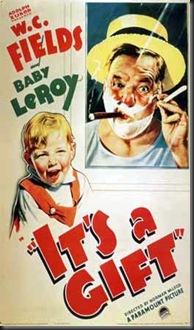
W.C. Fields was a deadpan comedic genius. He became famous as a vaudeville performer in the Ziegfeld Follies and most of his films borrow from gags he performed on the stage. It’s a Gift (1934) relies heavily on a number of his revue staples, as well as from his 1926 silent film, It’s the Old Army Game. In Fields’ world everything was fair game when it came to comedy. He had an antipathy toward most things domestic and traditional—even the handicapped were not off limits, as witnessed by his treatment of the blind and deaf Mr. Muckle. These comedic traits made Fields a unique Hollywood performer—plus, he could act, write, and juggle (he was a master juggler). His gift for improvisation can only be compared to that of Steve Carell’s today. Yes, he had a bit of a drinking problem…so what, Mozart had this same issue and by all accounts he was a pretty good musician.
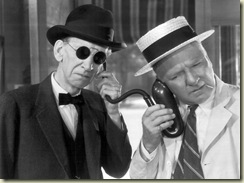 Director Norman McLeod was responsible for keeping Fields on track in It’s a Gift…he’d become an expert at dealing with improvisational ex-vaudevillians through his work with the Marx Brothers as well as his earlier films with Fields. The plot revolves around Harold Bissonette (Fields), a New Jersey grocer who hates his store, customers (especially Mr. Muckle, played by the hilarious Charles Sellon), neighbors, and family (especially his wife Amelia, played by the outstanding Kathleen Howard). Harold’s dream is to own an orange grove and ranch in California, and so when he learns that he may be inheriting some money, hope begins to seep into his mind. Never mind that his family has totally different ideas about where their newfound money might be used.
Director Norman McLeod was responsible for keeping Fields on track in It’s a Gift…he’d become an expert at dealing with improvisational ex-vaudevillians through his work with the Marx Brothers as well as his earlier films with Fields. The plot revolves around Harold Bissonette (Fields), a New Jersey grocer who hates his store, customers (especially Mr. Muckle, played by the hilarious Charles Sellon), neighbors, and family (especially his wife Amelia, played by the outstanding Kathleen Howard). Harold’s dream is to own an orange grove and ranch in California, and so when he learns that he may be inheriting some money, hope begins to seep into his mind. Never mind that his family has totally different ideas about where their newfound money might be used.
There a number of memorable scenes in this film. The first one is the bathroom scene, where Harold is carefully shaving with a straight razor while his daughter Mildred (Jean Rouverol) goes about her business as though he isn’t 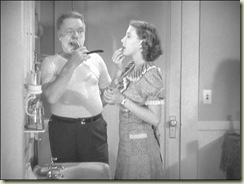 there. Several times she comes perilously close to hitting her father’s arm, thus helping him slit his own throat—metaphorically, that’s what a daughter can drive you to. After Mildred fully monopolizes the medicine cabinet mirror, Harold relies on a makeshift mirror on a light pull cord, which sways back and forth. Imagine trying to shave like that? Fields’ coming timing is superb…without the aid of much dialogue.
there. Several times she comes perilously close to hitting her father’s arm, thus helping him slit his own throat—metaphorically, that’s what a daughter can drive you to. After Mildred fully monopolizes the medicine cabinet mirror, Harold relies on a makeshift mirror on a light pull cord, which sways back and forth. Imagine trying to shave like that? Fields’ coming timing is superb…without the aid of much dialogue.
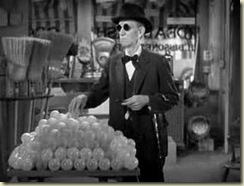 The second scene that stands out is the enormously funny grocery encounter between Harold and Mr. Muckle. Blind and deaf (he uses an ear trumpet) Mr. Muckle has a habit of breaking Harold’s glass door with his cane, which he wildly waves back and forth, and just about everything else that is encased in glass. It is side-splitting funny to watch him drop light bulbs on the floor while Harold tries to be as polite as possible. Later, once the tornado that is Mr. Muckle has left the store, we meet baby Ellwood (Baby LeRoy), his neighbor’s son. Harold refers to him as blood poison, and for good reason: baby Ellwood is a holy terror who likes to throw things at Harold and play in molasses.
The second scene that stands out is the enormously funny grocery encounter between Harold and Mr. Muckle. Blind and deaf (he uses an ear trumpet) Mr. Muckle has a habit of breaking Harold’s glass door with his cane, which he wildly waves back and forth, and just about everything else that is encased in glass. It is side-splitting funny to watch him drop light bulbs on the floor while Harold tries to be as polite as possible. Later, once the tornado that is Mr. Muckle has left the store, we meet baby Ellwood (Baby LeRoy), his neighbor’s son. Harold refers to him as blood poison, and for good reason: baby Ellwood is a holy terror who likes to throw things at Harold and play in molasses.
The third standout scene happens when Harold attempts to sleep on his porch. After listening to Amelia gripe about his plans to move to California for hours, Harold decides to sleep on the porch swing. Not only is the swing squeaky, but it is dilapidated as well. When he tries to lie down on it one of the chains break and he tries to sleep with 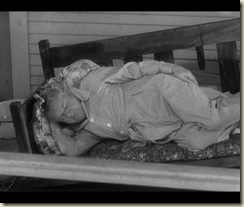 his head on the ground and his feet in the air. Noisy delivery men, neighbors, and an imposing insurance salesman (T. Roy Barnes) also disturb his slumber, but it is baby Ellwood that is the real bedbug. Grapes and icepicks are his weapons of noise (and near death for Harold). If you don’t laugh when Harold confronts Ellwood with the icepick then you don’t have a sense of humor.
his head on the ground and his feet in the air. Noisy delivery men, neighbors, and an imposing insurance salesman (T. Roy Barnes) also disturb his slumber, but it is baby Ellwood that is the real bedbug. Grapes and icepicks are his weapons of noise (and near death for Harold). If you don’t laugh when Harold confronts Ellwood with the icepick then you don’t have a sense of humor.
And, finally, the road trip California has numerous laugh-out-loud gags as well. The picnic scene on the private estate is highly comical, especially the gags with the can opener and statues. And, Amelia’s reaction when they reach the sun-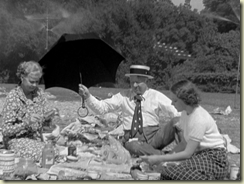 parched land that’s supposed to be their orange grove is one of Kathleen Howard’s best scenes.
parched land that’s supposed to be their orange grove is one of Kathleen Howard’s best scenes.
I really enjoy watching W.C. Fields. My favorite type of comedy is a sophisticated one, but I also enjoy deadpan and gag comedy as well. I don’t think there was a better deadpan comic during the early years of Hollywood than Fields. I once read that Louise Brooks (who worked with Fields at the Follies and in some early films) thought he was much funnier on the stage than the screen because his brilliance couldn’t be chopped up by a film editor on the open stage. It must have been a sight to behold, because his movies are pretty darn funny—imagine seeing him live without the constraints of censors.

Director Norman McLeod was responsible for keeping Fields on track in It’s a Gift…he’d become an expert at dealing with improvisational ex-vaudevillians through his work with the Marx Brothers as well as his earlier films with Fields. The plot revolves around Harold Bissonette (Fields), a New Jersey grocer who hates his store, customers (especially Mr. Muckle, played by the hilarious Charles Sellon), neighbors, and family (especially his wife Amelia, played by the outstanding Kathleen Howard). Harold’s dream is to own an orange grove and ranch in California, and so when he learns that he may be inheriting some money, hope begins to seep into his mind. Never mind that his family has totally different ideas about where their newfound money might be used.
there. Several times she comes perilously close to hitting her father’s arm, thus helping him slit his own throat—metaphorically, that’s what a daughter can drive you to. After Mildred fully monopolizes the medicine cabinet mirror, Harold relies on a makeshift mirror on a light pull cord, which sways back and forth. Imagine trying to shave like that? Fields’ coming timing is superb…without the aid of much dialogue.
The second scene that stands out is the enormously funny grocery encounter between Harold and Mr. Muckle. Blind and deaf (he uses an ear trumpet) Mr. Muckle has a habit of breaking Harold’s glass door with his cane, which he wildly waves back and forth, and just about everything else that is encased in glass. It is side-splitting funny to watch him drop light bulbs on the floor while Harold tries to be as polite as possible. Later, once the tornado that is Mr. Muckle has left the store, we meet baby Ellwood (Baby LeRoy), his neighbor’s son. Harold refers to him as blood poison, and for good reason: baby Ellwood is a holy terror who likes to throw things at Harold and play in molasses.
his head on the ground and his feet in the air. Noisy delivery men, neighbors, and an imposing insurance salesman (T. Roy Barnes) also disturb his slumber, but it is baby Ellwood that is the real bedbug. Grapes and icepicks are his weapons of noise (and near death for Harold). If you don’t laugh when Harold confronts Ellwood with the icepick then you don’t have a sense of humor.
parched land that’s supposed to be their orange grove is one of Kathleen Howard’s best scenes.














Kim, this is a fine review of one of W.C.'s best movies. I think he occasionally got stuck in movies where his comedic talents were a little shackled. For example, I looked forward to seeing MY LITTLE CHICKADEE for years, but was disappointed when I did because it tried to be a Fields movie and a Mae West movie and wound up being neither. But in outings like IT'S A GIFT, NEVER GIVE A SUCKER AN EVEN BREAK, and THE BANK DICK, Fields was in his element...and very funny.
ReplyDeleteI loved Mr. Muckles in this. This is my Fields favorite after The Bank Dick.
ReplyDeleteHave not seen this one but have seen some other great Fields works like NEVER GIVE A SUCKER AN EVEN BREAK, THE BANK DICK, MY LITTLE CHICKADEE and a few shorts THE DENTIST (a small masterpiece) and THE BARBERSHOP. Most interesting was the D.W. Griffith silent "SALLY OF THE SAWDUST. I am going to have to get a hold of a copy of this. Nice job.
ReplyDeleteI haven't seen much from Fields, and I haven't caught this one yet. I do like my humor dry, so maybe I should pick up a few of his films. I see that this film is available on DVD (as part of a set), as well as a number of W.C. Fields' movies. It's always a treat to read your posts, Kim, particularly when it's clear that you're a fan.
ReplyDeleteKim, you have written another wonderful review! I liked the chances Fields was willing to take. One of my favorite examples of this is when he purchases multiple cars so that he can make an example of road hogs in "If I had a Million." Great job again!
ReplyDelete